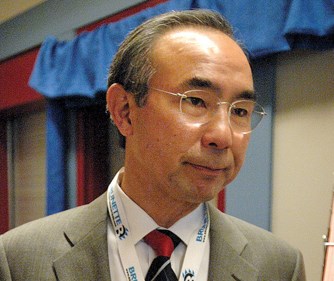UNBC's board of governors approved a $68.4 million balanced operating budget for the 2013-14 school year, which will mean another two per cent tuition hike, increased monthly parking fees and staff cuts.
Full-time undergraduate student fees at UNBC will rise an average $94 per year to $4,816, the fifth consecutive year student fees have jumped by two per cent. The increased fees are expected to generate an additional $330,000.
UNBC president George Iwama said while the university continues to seek other revenue sources, static enrollment numbers and reduced levels of government funding the past four years, which have failed to keep up with inflation, left the board no choice but to download some of the increased operating costs on students.
"Because students who come to UNBC in the North aren't just taking a bus from Broadway, they pack up and leave and incur higher debts on average to attend our institutions, so we feel for them, indeed," said Iwama. "At the same time, the negative pressures on enrollment in comparison to some of the other Lower Mainland institutions are some of the realities we live with - and the struggle to balance the budget, as we're legislated to do, is quite a challenge.
"We are just coming out of four years of zero increases in our operating grant from the government and it's not like BC Hydro and other utilities have said they understand and won't charge us more. With wage settlements [with support staff] we have to increase the salaries of our workers here."
Close to two-thirds of UNBC's operating budget is provided by the province, while 27 per cent comes from tuition fees. Wages and benefits account for three-quarters of expenditures. Unlike UBC, the University of Victoria and Simon Fraser University - which are operating at or above enrollment capacity in terms of the number of provincially-funded seats now occupied by students - UNBC is not filling its classrooms, operating at slightly less than 90 per cent. Regardless of the outcome of the May 14 provincial election, Iwama says it's time for the province to show it is willing to increase spending on colleges and universities to support the increasing need for a skilled labour force. He said UNBC will continue efforts to increase private and corporate-sector donations and will find other savings by transferring some profits from ancillary services to the operating budget.
"We certainly would like the new government, whatever colour it is, to renew their commitment to post-secondary because it is the future of our children that will sustain the prosperity we want to maintain and grown in our province as a model for the rest of the country," Iwama said.
The board also decided Saturday that three full-time non-faculty UNBC staff will be laid off and one vacant faculty position will be eliminated. UNBC will not reveal which department the layoffs will affect until staff have been told.
UNBC has yet to negotiate a new contract with its non-unionized faculty staff, which will be dealt with in June, when an arbitrator becomes available. The UNBC Faculty Association has made it known to management salaries for UNBC professors rank among the lowest in Canada and they expect that to be addressed in the next contract.
"I'd like them to be the best-paid professors in the world because they deserve it, and the fact we are challenged on the revenue side in what we can offer them is a terrible reality," said Iwama. "My hope is that through aggressive fundraising we can not only compensate them at the best levels, but increase our professors and lecturers and instructors so people can sustain healthy careers at UNBC."
Monthly parking permits at the Cranbrook Hill campus will increase $5 per month. The current charge, including HST, is $44.80 per month. Metered parking fees will remain at $3 per hour.
Iwama said UNBC will continue to try to recruit international students and will push for growth in virtual classroom learning opportunities, like the gender studies program which utilizes high-definition video to link students at UNBC with a university class in Tokyo.
"We've already had an invitation to expand that to six other countries," said Iwama. "We want to increase our international students for the right reasons. It certainly helps the institution in terms of tuition, but they also bring dollars to our community. They are wonderful members of our community and we also send students abroad through our exchange programs."



